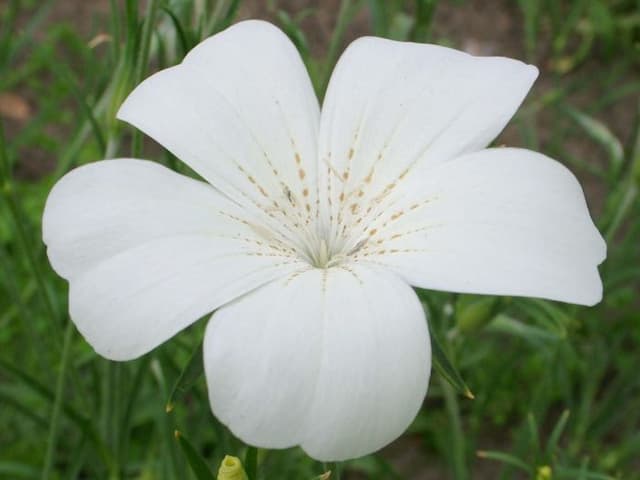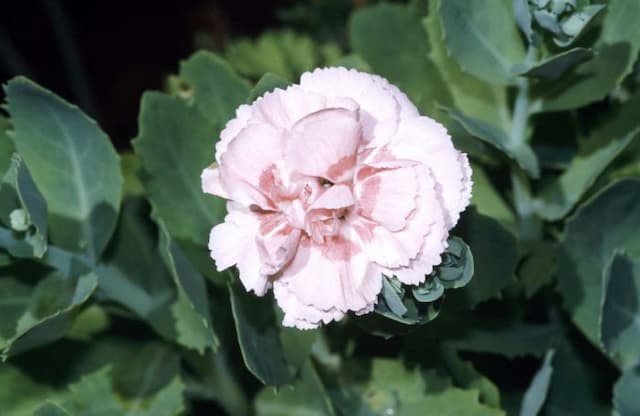Pink Dianthus Slap 'n' Tickle = 'Wp 05 Pp 22' (PBR) (Scent First Series) (p)
![pink [Slap 'n' Tickle]](/_next/image?url=https%3A%2F%2Fplants-admin.emdemapps.com%2Fimages%2Fplants%2F%2Fimages%2F604b558746440.png&w=3840&q=75)
ABOUT
Dianthus Slap 'n' Tickle is a charming perennial that belongs to the Scent First Series notable for their striking fragrance. This plant features a compact mound of narrow, green leaves. The flowers are what truly set this Dianthus apart, with their unique and vibrant appearance. They boast double blooms that exhibit a mix of color—usually, a pink or red base with contrasting hues often appearing as a mixture of deeper and lighter shades, sometimes with a fringed or serrated petal edge giving them a whimsical, frilly look. These petals might have a velvety texture which is quite enticing to the touch. The bloom is also known for its strong, spicy fragrance that can fill a garden space with a sweet perfume, particularly on calm, warm days. Flowering typically occurs in the late spring to early summer and sometimes continues sporadically into the fall. The plant often has an upright habit in which the flowers are presented on stem tops, creating splashes of eye-catching color above the foliage. Alluring to butterflies and other pollinators, Dianthus Slap 'n' Tickle serves as a fantastic addition for adding sensory delight to any garden or landscape.
About this plant
 Names
NamesFamily
Caryophyllaceae
Synonyms
Pinks, Carnations, Sweet William
Common names
Dianthus 'Wp 05 Pp 22'
 Toxicity
ToxicityTo humans
The common name for Dianthus Slap 'n' Tickle is Pink. Generally, Pinks are not considered toxic to humans. If ingested in large quantities, they may cause mild gastrointestinal discomfort, but serious poisoning is rare. Always exercise caution and avoid ingesting parts of ornamental plants due to potential individual sensitivities and the possibility of misidentification.
To pets
The common name for Dianthus Slap 'n' Tickle is Pink. Pinks are typically non-toxic to pets. Nonetheless, it's possible that some pets might experience mild digestive upset if they ingest parts of the plant, especially in large amounts. As with any non-food plant, it's advisable to prevent pets from eating ornamental plants to avoid any potential issues. If you suspect your pet has ingested a substantial amount of the plant and is showing signs of illness, consult a veterinarian.
 Characteristics
CharacteristicsLife cycle
Perennials
Foliage type
Evergreen
Color of leaves
Green
Flower color
Pink
Height
1 foot (0.3 meters)
Spread
1 foot (0.3 meters)
Plant type
Herb
Hardiness zones
5
Native area
Europe
Benefits
 General Benefits
General Benefits- Attractive Blooms: The Dianthus 'Scent First Slap 'n' Tickle' features showy pink flowers with frilled edges that are visually appealing in any garden setting.
- Long Flowering Period: It blooms over a long season from late spring to early fall, providing long-lasting color to gardens.
- Fragrant: As part of the Scent First Series, it has a strong, spicy fragrance that adds a sensory dimension to outdoor spaces.
- Compact Size: Its relatively small size makes it suitable for container gardening, borders, or small garden spaces.
- Drought Tolerance: Once established, it is drought-resistant, making it a good choice for water-wise gardens.
- Easy Care: It is generally low-maintenance, requiring minimal care beyond deadheading and occasional water in dry conditions.
- Cold Hardy: This plant is capable of withstanding cooler temperatures, making it suitable for planting in a range of climates.
- Attracts Pollinators: The bright blooms are attractive to bees and butterflies, promoting biodiversity in the garden.
 Medical Properties
Medical PropertiesThis plant is not used for medical purposes.
 Air-purifying Qualities
Air-purifying QualitiesThis plant is not specifically known for air purifying qualities.
 Other Uses
Other Uses- Culinary garnish: Dianthus petals are edible and can be used to add color and a slight spicy flavor to salads or desserts.
- Natural fabric dye: The flowers of the Dianthus can be used to create a range of pink and red hues for dyeing fabrics naturally.
- Art supplies: Crushed Dianthus petals can be mixed with a binder to create natural, eco-friendly paint for art projects.
- Eco-friendly confetti: Dried petals serve as a biodegradable alternative to traditional paper or plastic confetti at celebrations.
- Book pressing: The flowers can be pressed in between the pages of a book to create delicate, dried flower bookmarks or decorations.
- Aromatherapy sachets: The fragrant petals can be dried and placed in sachets to freshen up drawers or closets.
- Botanical paper making: The petals can be incorporated into the papermaking process to create unique, textured paper with floral inclusions.
- Candle decoration: Dianthus petals can be set into the wax of homemade candles for an attractive floral touch.
- Photography props: The flowers can be used in photography for still life compositions or as a natural prop to add color and interest to the scene.
- Soap making: Dianthus petals can be added to homemade soaps for exfoliation, visual appeal, and fragrance.
Interesting Facts
 Feng Shui
Feng ShuiThe plant Carnation is not used in Feng Shui practice.
 Zodiac Sign Compitability
Zodiac Sign CompitabilityThe plant Carnation is not used in astrology practice.
 Plant Symbolism
Plant Symbolism- Love and Affection: Dianthus, commonly known as "pinks," often represent love and affection due to their long history of being used in bouquets and their charming appearance.
- Boldness: The name 'Slap 'n' Tickle' suggests a playful boldness, which can be symbolic of stepping out with confidence and embracing life's adventures.
- Fragrance: Being part of the Scent First Series, this Dianthus variety is likely to have a delightful fragrance, which can symbolize the sweet and pleasant experiences in life.
- Pureness and Innocence: The color white, often associated with pinks, signifies purity and innocence, and dianthus flowers are no exception.
- Passion: The vibrant colors of Dianthus can symbolize deep feelings and passion, reflecting intense emotions and a zest for life.
- Longevity: With proper care, dianthus plants can thrive and bloom for extended periods, symbolizing enduring affection or lasting impact.
 Water
WaterCarnations, like Dianthus 'Slap 'n' Tickle', should be watered deeply to encourage root growth, typically receiving about 1 inch of water per week. This can translate to around 0.623 gallons per square yard each week. If using a container, water until the excess flows out of the bottom, usually equating to around 8-16 ounces for a standard pot, depending on size and weather conditions. Reduce watering in the winter months when the plant isn't actively growing. Check the soil moisture before watering to ensure it's dry an inch below the surface to avoid overwatering.
 Light
LightCarnations, such as Dianthus 'Slap 'n' Tickle', thrive in areas that receive full sun to partial shade. The ideal spot for planting is one where they receive at least six hours of direct sunlight per day. However, in extremely hot climates, they benefit from some afternoon shade to protect them from the intense heat.
 Temperature
TemperatureCarnations like Dianthus 'Slap 'n' Tickle' prefer cooler temperatures and can survive in areas where the temperature ranges between 40°F and 85°F. They can tolerate temporary dips below freezing, but prolonged exposure to temperatures below 40°F may damage the plant. The ideal growing temperature for carnations is between 50°F and 70°F.
 Pruning
PruningCarnations, including Dianthus 'Slap 'n' Tickle', require pruning to promote bushy growth, remove spent flowers, and maintain plant health. Deadheading, or removing faded flowers, can be done regularly throughout the blooming season to encourage more blooms. Cut back the foliage by one-third in late summer to early fall to rejuvenate the plant for the next flowering cycle. Pruning is best done with sanitized shears to prevent the spread of disease.
 Cleaning
CleaningAs needed
 Soil
SoilDianthus, commonly known as pinks, thrives in well-draining soil with a slightly alkaline pH of around 7.0 to 8.0. A good soil mix for pinks would include one part garden soil, one part compost, and one part coarse sand or perlite to ensure proper drainage. Additionally, incorporating a slow-release granular fertilizer into the soil can provide nutrients throughout the growing season.
 Repotting
RepottingPinks, including Dianthus 'Slap 'n' Tickle', do not require frequent repotting and can often thrive in the same pot for several years. It is generally recommended to repot these plants if they become root-bound or if the soil quality has significantly deteriorated, which might happen every 2-3 years.
 Humidity & Misting
Humidity & MistingPinks prefer average to low humidity conditions. As Dianthus 'Slap 'n' Tickle' is drought tolerant once established, it is more important to avoid high humidity levels that can lead to problems like fungal diseases. No specific humidity level is required, but ensuring good air circulation can help keep the humidity around the plant at comfortable levels for its health.
 Suitable locations
Suitable locationsIndoor
Place in bright light, away from heating sources, well-draining soil.
Outdoor
Full sun, well-drained soil, mulch lightly, avoid oversaturation.
Hardiness zone
5-9 USDA
 Life cycle
Life cycleThe Dianthus 'Slap 'n' Tickle', part of the Scent First Series, begins its life cycle with seed germination in fertile, well-drained soil, preferably in full sun. The seedlings emerge and develop into rosettes of slender, bluish-green foliage, which then mature and start to form sturdy, upright stems. As it enters the flowering stage, clusters of blooms appear atop these stems, exuding a spicy, clove-like fragrance. The flowers, characterized by their ruffled edges and rich pink color, attract pollinators such as bees and butterflies. After pollination, the plant may produce seeds that can be collected for propagation or allowed to self-seed. The Dianthus 'Slap 'n' Tickle' may enter a period of dormancy in colder climates, during which it conserves energy before the cycle restarts with new growth in the following growing season.
 Propogation
PropogationPropogation time
Spring to Summer
Propogation: The Dianthus 'Slap 'n' Tickle', also known as Pink Kisses, is typically propagated through cuttings. This method is popular as it helps to maintain the unique characteristics of the patented variety. To propagate Pink Kisses through cuttings, choose healthy and non-flowering stems to increase the chances of rooting. Cut a stem about 4 to 6 inches (approximately 10 to 15 centimeters) long, ensuring several nodes are present. Remove the lower leaves to reduce moisture loss and insert the cutting into a well-draining soil mix. Keep the soil moist but not soggy, and place the container in a warm spot with bright, indirect sunlight. Roots usually develop within a few weeks, after which the plant can be transferred to a larger pot or the garden.








![Pink [Bubblegum]](/_next/image?url=https%3A%2F%2Fplants-admin.emdemapps.com%2Fimages%2Fplants%2F%2Fimages%2F604b596f31cbb.png&w=640&q=75)
